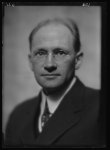19 Oct. 1866–16 Nov. 1951

Edwin August Björkman, journalist, literary critic, and translator, was born in Stockholm, Sweden, the son of Anders August and Johanna Elizabeth Anderson Björkman. He attended South-End Higher Latin School in Stockholm and worked as a clerk, journalist, and actor from 1881 to 1891. He was a founder of the Swedish Wholesale Clerk's Association and a member of the Lindberg Drama Company and Swedish Royal Theater Company in 1889–91.
In 1891, Björkman came to the United States and joined the Scandinavian colony in Minnesota, where he was editor of the bilingual Minnesota Posten of St. Paul (1892–94). He was a reporter and music critic for the Minneapolis Times from 1894 to 1897 and a reporter on the New York Sun and New York Times from 1897 to 1905, except for a tour of duty in 1898 with the Twenty-third Regiment of the New York Militia during the Spanish-American War. In 1906 he joined the editorial staff of the New York Evening Post, where he served until becoming department editor of the World's Work in 1909. From 1912 to 1915, Björkman was editor of the Modern Drama Series, where he quickly attained international eminence for his translations of plays by August Strindberg, Arthur Schnitzler, and other European dramatists. In 1914 he was awarded a scholarship by the American Scandinavian Foundation for critical studies in Europe.
During World War I, Björkman served in Sweden with the British Department of Information (1915–17) and as Director of the Scandinavian Bureau of the American Committee on Public Information (1918–19). In 1919 he was made a Knight of the Order of the Dannebrog by the Danish government in recognition of his wartime service. In 1920–21 he served as assistant director of the League of Nations News Bureau. For three years he was a lecturer in modern Scandinavian drama at Yale University.
Björkman settled in Waynesville, N.C., in 1925 and served as literary editor of the Asheville Times from 1926 to 1929. He subsequently worked for the U.S. Geological Bureau. From October 1935 to August 1941, he was director of the North Carolina Federal Writers Project of the WPA. Under his supervision, the group published North Carolina: A Guide to the Old North State in 1939. In 1947 he was president of the Asheville chapter of the Southern Conference for Human Welfare, and in 1948 he was a member of the executive committee of the Progressive party.
Björkman's novels, essays, poetry, and literary criticism reflect his concern with individual and collective freedom, civil rights, and the advancement of civilization. Among his major works are Is There Anything New under the Sun? (1911), Gleams: A Fragmentary Interpretation of Man and His World (1912), Voices of Tomorrow (1913), Scandinavia and the War (1914), The Cry of the Ukraine (1915), The Soul of a Child (1922), Gates of Life (1923), The Search for Atlantis (1927), Ibsen as He Should Be Read, and The Wings of Azrael (1934). He translated novels by Gustaf af Geijerstam, Frank Heller, Harry Soiberg, and Olav Duun. In 1926 he translated Georg Brandes's Jesus: A Myth. As editor of the Modern Drama Series, he translated four volumes of the plays of August Strindberg (1912–15), two volumes of plays by Bjornstjorne Bjornson (1913–14), plays by Hjalmar Bergstrom (1913), plays by Arthur Schnitzler (1915), and dramatic works by Gunnar Heiberg and Fritz von Unruh.
Björkman was married four times, first to Frances Maule, a suffragist, in 1906, and next to Virginia MacFadyen, an actress, in 1923. In 1930 he married Ellie May Platt, who died in Paris in 1932; and in 1934 he married Lucy Millender. Björkman died in Asheville and was buried there in Riverside Cemetery.